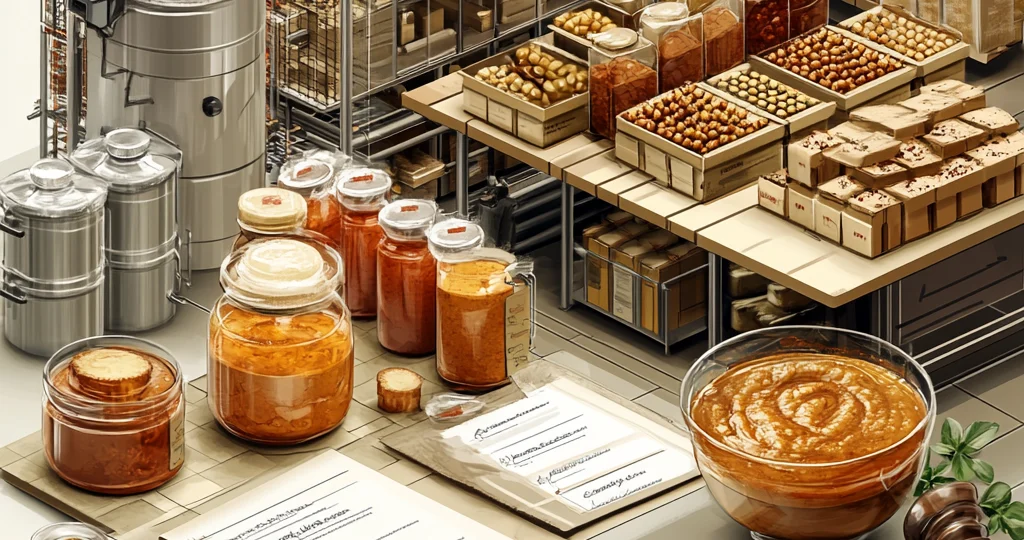
For small-scale food producers, partnering with co-packers can be a game-changer, enabling them to scale production and reach new markets. However, navigating the legal aspects of co-packer agreements is crucial for protecting your brand, ensuring quality, and avoiding potential pitfalls. In this article, we’ll delve into the specifics of co-packer agreements, covering key contract terms, legal considerations, and best practices for artisanal food producers.
Understanding Co-Packing and Its Benefits
Co-packing, or contract manufacturing, involves outsourcing the production of food products to a third-party facility. For artisanal food producers, this arrangement offers several advantages:
- Scalability: Co-packers have the capacity to produce larger volumes, allowing small-scale producers to meet increased demand without investing in their own production facilities.
- Expertise: Co-packers often specialize in specific food categories and have the technical know-how to ensure consistent quality and compliance with industry standards.
- Cost Efficiency: By sharing production costs with other brands, artisanal producers can benefit from economies of scale, reducing per-unit production costs.
- Market Expansion: Co-packing can enable producers to enter new markets, including national or international distribution, by meeting regulatory requirements and logistical demands.
Key Components of Co-Packer Agreements
When entering into a co-packer agreement, it’s essential to define the terms and responsibilities of both parties. The agreement typically includes the following key components:
- Scope of Work: This outlines the specific products to be manufactured, production volumes, quality standards, packaging requirements, and delivery schedules.
- Pricing and Payment Terms: The agreement should clearly define the pricing structure, including unit costs, payment schedules, and any additional fees for ingredients, packaging, or services.
- Intellectual Property (IP) Rights: Artisanal producers must protect their recipes, branding, and proprietary processes. The agreement should specify who owns the IP related to the products and packaging, as well as any restrictions on its use.
- Quality Control and Assurance: Co-packers must adhere to agreed-upon quality standards, including ingredient sourcing, production processes, testing, and compliance with food safety regulations. Producers should have the right to inspect facilities and conduct audits.
- Confidentiality: Both parties should maintain strict confidentiality regarding sensitive business information, recipes, formulas, and pricing details to prevent unauthorized disclosure.
- Liability and Insurance: The agreement should clearly define each party’s liability for product defects, recalls, or other issues. It should also specify the types and amounts of insurance coverage required.
- Term and Termination: The duration of the agreement, renewal options, and conditions for termination (e.g., breach of contract, non-performance) should be clearly stated to avoid disputes.
- Dispute Resolution: A well-drafted agreement includes a clause specifying the method of resolving disputes, such as through mediation, arbitration, or litigation, and the applicable jurisdiction.
Legal Considerations for Artisanal Producers
For small-scale food producers, entering into a co-packer agreement involves legal risks and complexities that require careful consideration:
- Protecting Your Brand: Ensure that the agreement safeguards your brand’s reputation by specifying quality control measures, IP protection, and the right to approve product samples before production.
- Clear Communication: The agreement should clearly define expectations, responsibilities, and deliverables for both parties, leaving no room for ambiguity.
- Regulatory Compliance: Verify that the co-packer is compliant with all relevant food safety, labeling, and manufacturing regulations, especially if you plan to distribute nationally or internationally.
- Risk Allocation: Understand the allocation of risks between you and the co-packer, particularly in terms of product liability, recalls, and indemnification for losses.
- Flexibility and Scalability: Anticipate future growth and ensure the agreement allows for adjustments in production volumes, pricing, and terms to accommodate changing business needs.
- Exit Strategy: Include clear provisions for terminating the agreement, including the return of proprietary information, molds, and other assets, to avoid complications in case of a parting of ways.
Best Practices for Negotiating Co-Packer Agreements
When negotiating a co-packer agreement, follow these best practices to protect your interests and build a successful partnership:
- Seek Legal Counsel: Work with an experienced food law attorney to review and negotiate the agreement, ensuring that it aligns with your business goals and provides adequate protection.
- Conduct Due Diligence: Thoroughly vet the co-packer’s facilities, production processes, and track record. Request references and visit the facility if possible to assess quality and compliance.
- Define Performance Metrics: Include clear, measurable performance metrics in the agreement, such as production yields, on-time delivery, and quality standards, with provisions for penalties or bonuses based on performance.
- Build Relationships: Establish open communication and a collaborative relationship with your co-packer. Regularly communicate your brand’s values, market feedback, and any changes in product specifications.
- Regular Audits and Inspections: Schedule regular audits of the co-packer’s facilities and processes to ensure ongoing compliance with the agreement and regulatory standards.
- Review and Update: Periodically review the agreement to ensure it remains relevant to your business needs, especially as you grow and expand into new markets.
Co-packer agreements are a vital tool for artisanal food producers looking to scale their operations while maintaining quality and consistency. By understanding the legal aspects, negotiating effectively, and building strong partnerships, small-scale producers can leverage co-packing to achieve sustainable growth and success in the competitive food industry.
